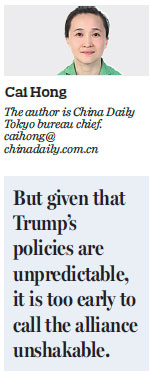Abe in the firing line for his dependency on the US alliance
A Japanese government official told the Kyodo News on Saturday that the country plans to update its defense program guidelines five years earlier than initially planned. The guidelines are usually revised every 10 years.
It is an obvious sop to US President Donald Trump in the hope of strengthening the Japan-US defense alliance.
Japanese Prime Minister Shinzo Abe acknowledged that he and Trump had spent a fair amount of time talking about the alliance and China during their meeting earlier this month.
At the Diet's lower house budget committee on Tuesday, Abe called handling relations with China "the greatest task of this century", adding that Japan and the United States must further strengthen their military alliance so that China will move "in the right direction".
Abe told Trump the world will fall into "chaos" unless the US fulfills its role as leader of the free world.
The joint statement released after the Abe-Trump meeting on Feb 10 stipulated that Article 5 of the Japan-US Security Treaty, under which the US is obliged to defend Japan in case of an armed attack on the country, extends to the Diaoyu Islands.

Japan, in return, will assume a larger role and more responsibilities in the alliance.
However, in an editorial, The Asahi Shimbun warned that in a world full of uncertainty, it is dangerous for Japan to rely on its conventional diplomacy of relying on the support of the US.
The Asahi Shimbun called for the Abe administration to behave more independently in deepening multilateral and multilayered ties with China, the Republic of Korea, Australia, Southeast Asian nations and other countries, with Japan-US ties as a cornerstone.
The Mainichi Shimbun said the US may use the joint statement to press Japan to make concessions in various situations in the future.
"The generosity shown in the statement may represent the US strategy of first giving Japan what it desires and then making it impossible for Japan to turn down US demands."
"If Japan were to keep assuming that the United States and Japan will jointly counter China, it would be failing to accurately grasp US-China relations," it added, calling on the Abe administration to "proactively move to improve its ties with Beijing".
Japan's opposition party leaders blasted Abe for kowtowing to Trump in front of a global audience.
They also criticized Abe for making no comment, except calling it "a domestic matter", on Trump's executive order banning the entry of refugees and nationals from seven Muslim-majority nations.
Kazuo Shii, the Japanese Communist Party leader, said Abe had taken a position of "the Japan-US alliance first" in response to Trump's "America First" stance.
To win favor with the Trump administration, the Japanese government began offshore construction work on Feb 6, taking a major step to relocate US Marine Corps Air Station Futenma from Okinawa's Ginowan to Henoko.
Abe backed Japan importing more US defense equipment. He argued that the move, in line with Trump's "Buy American" slogan, will contribute to the US economy and job creation, a top policy priority for the US president.
Japan has already been a good customer for the US defense industry, with a steady growth in Japan's defense outlay since Abe took power for a second time in 2012.
Many pundits are reminding Abe that Japan could lose the international community's confidence if he cozies up to Trump simply to secure an "unshakable Japan-US alliance".
But given that Trump's policies are unpredictable, it is too early to call the alliance unshakable.
The author is China Daily Tokyo bureau chief. caihong@chinadaily.com.cn
























